关于文化冲击的英语作文及翻译_高二满分英语作文2篇
- 格式:doc
- 大小:11.46 KB
- 文档页数:2
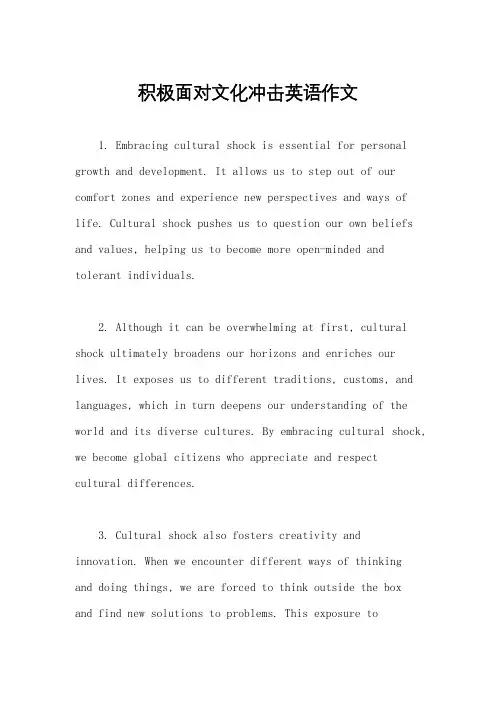
积极面对文化冲击英语作文1. Embracing cultural shock is essential for personal growth and development. It allows us to step out of our comfort zones and experience new perspectives and ways of life. Cultural shock pushes us to question our own beliefs and values, helping us to become more open-minded and tolerant individuals.2. Although it can be overwhelming at first, cultural shock ultimately broadens our horizons and enriches our lives. It exposes us to different traditions, customs, and languages, which in turn deepens our understanding of the world and its diverse cultures. By embracing cultural shock, we become global citizens who appreciate and respectcultural differences.3. Cultural shock also fosters creativity and innovation. When we encounter different ways of thinkingand doing things, we are forced to think outside the boxand find new solutions to problems. This exposure todiverse perspectives can spark inspiration and lead to breakthrough ideas and inventions.4. Moreover, cultural shock teaches us resilience and adaptability. It challenges us to navigate unfamiliar environments and situations, forcing us to develop coping mechanisms and problem-solving skills. These skills are not only valuable in dealing with cultural shock but also in other aspects of life, such as career challenges or personal relationships.5. It is important to note that cultural shock is not a one-time experience but a continuous process. As we encounter new cultures and immerse ourselves in different environments, we may face multiple instances of cultural shock. However, each experience builds upon the previous ones, making us more equipped to handle future challenges and adapt to new cultural contexts.6. Lastly, embracing cultural shock allows us to form meaningful connections with people from different backgrounds. By understanding and appreciating theircultures, we can bridge gaps and foster mutual respect and understanding. These connections not only enrich our personal lives but also contribute to a more harmonious and inclusive society.In conclusion, embracing cultural shock is crucial for personal growth, creativity, adaptability, and fostering meaningful connections. It allows us to become more open-minded, tolerant, and globally aware individuals. So, let us embrace cultural shock with open arms and embrace the opportunities it brings.。
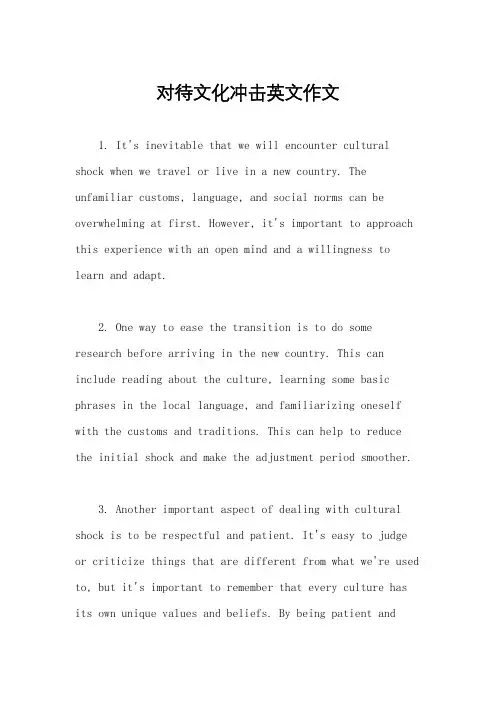
对待文化冲击英文作文1. It's inevitable that we will encounter cultural shock when we travel or live in a new country. The unfamiliar customs, language, and social norms can be overwhelming at first. However, it's important to approach this experience with an open mind and a willingness to learn and adapt.2. One way to ease the transition is to do some research before arriving in the new country. This can include reading about the culture, learning some basic phrases in the local language, and familiarizing oneself with the customs and traditions. This can help to reduce the initial shock and make the adjustment period smoother.3. Another important aspect of dealing with cultural shock is to be respectful and patient. It's easy to judge or criticize things that are different from what we're used to, but it's important to remember that every culture has its own unique values and beliefs. By being patient andopen-minded, we can learn to appreciate and respect these differences.4. Communication is also key in dealing with cultural shock. It's important to ask questions and seekclarification when we don't understand something, rather than assuming or making assumptions. This can help to avoid misunderstandings and foster better relationships with the local community.5. Finally, it's important to remember that cultural shock is a natural part of the process of adapting to a new culture. It may take time to fully adjust, but with an open mind, patience, and a willingness to learn, we can overcome the challenges and embrace the richness and diversity of the new culture.。
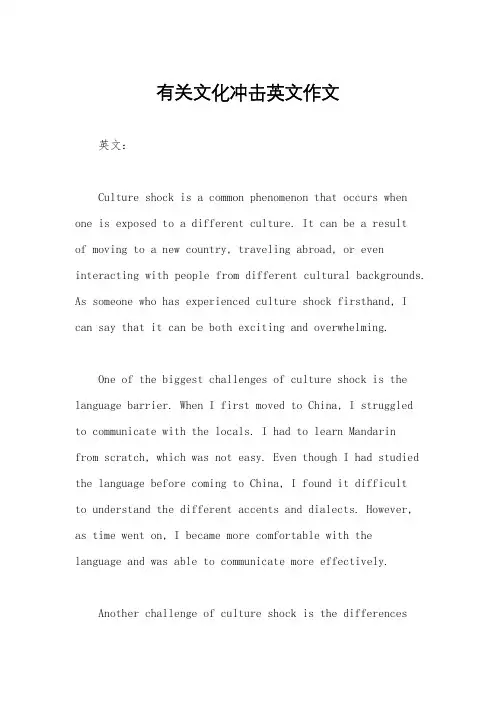
有关文化冲击英文作文英文:Culture shock is a common phenomenon that occurs when one is exposed to a different culture. It can be a resultof moving to a new country, traveling abroad, or even interacting with people from different cultural backgrounds. As someone who has experienced culture shock firsthand, I can say that it can be both exciting and overwhelming.One of the biggest challenges of culture shock is the language barrier. When I first moved to China, I struggledto communicate with the locals. I had to learn Mandarinfrom scratch, which was not easy. Even though I had studied the language before coming to China, I found it difficultto understand the different accents and dialects. However, as time went on, I became more comfortable with the language and was able to communicate more effectively.Another challenge of culture shock is the differencesin social norms and customs. For example, in China, it is common to slurp your soup or noodles, which is considered impolite in Western culture. I also had to get used to the concept of "saving face" in China, which means avoiding public embarrassment or shame. In Western culture, it is more acceptable to express your emotions openly.Despite the challenges, culture shock can also be a positive experience. It allows you to broaden your perspective and learn about different cultures. For example, I have learned to appreciate the importance of family and community in Chinese culture. I have also tried new foods and experienced different traditions and celebrations.Overall, culture shock is a natural part ofexperiencing different cultures. It can be difficult at times, but it also provides an opportunity for personal growth and learning.中文:文化冲击是当一个人接触到不同文化时常见的现象。
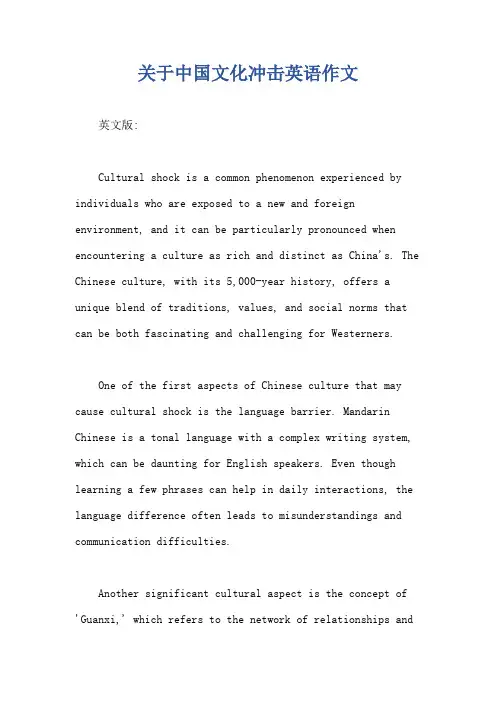
关于中国文化冲击英语作文英文版:Cultural shock is a common phenomenon experienced by individuals who are exposed to a new and foreign environment, and it can be particularly pronounced when encountering a culture as rich and distinct as China's. The Chinese culture, with its 5,000-year history, offers a unique blend of traditions, values, and social norms that can be both fascinating and challenging for Westerners.One of the first aspects of Chinese culture that may cause cultural shock is the language barrier. Mandarin Chinese is a tonal language with a complex writing system, which can be daunting for English speakers. Even though learning a few phrases can help in daily interactions, the language difference often leads to misunderstandings and communication difficulties.Another significant cultural aspect is the concept of 'Guanxi,' which refers to the network of relationships andconnections that play a crucial role in Chinese society. It is a system that values personal relationships over individual achievements and can be confusing for those accustomed to the more individualistic Western culture.The concept of 'face' or 'Mianzi' is also central to Chinese culture. It involves maintaining one's reputation and dignity in social interactions, and it can influence behavior in various ways. For example, public criticism is avoided, and indirect communication is often preferred to save face.Social etiquette in China also differs from Western norms. For instance, the practice of giving and receiving business cards with both hands and the importance of seniority in social settings are customs that may seem unusual to foreigners.Food is another area where cultural differences are evident. Chinese cuisine is diverse and often involves flavors and ingredients that are unfamiliar to Western palates. The practice of sharing dishes and the use ofchopsticks can also be a new experience for many.Lastly, the Chinese approach to time can be a source of cultural shock. The Chinese concept of time is morecircular and less linear than in the West, which can lead to different attitudes towards punctuality and scheduling.In conclusion, the cultural shock experienced when encountering Chinese culture is multifaceted, involving language, social norms, and values. It requires patience, open-mindedness, and a willingness to learn and adapt. Embracing these differences can lead to a deeper understanding and appreciation of the rich cultural tapestry that is China.中文版:文化冲击是一个常见的现象,尤其是当人们接触到一个全新且陌生的环境时。
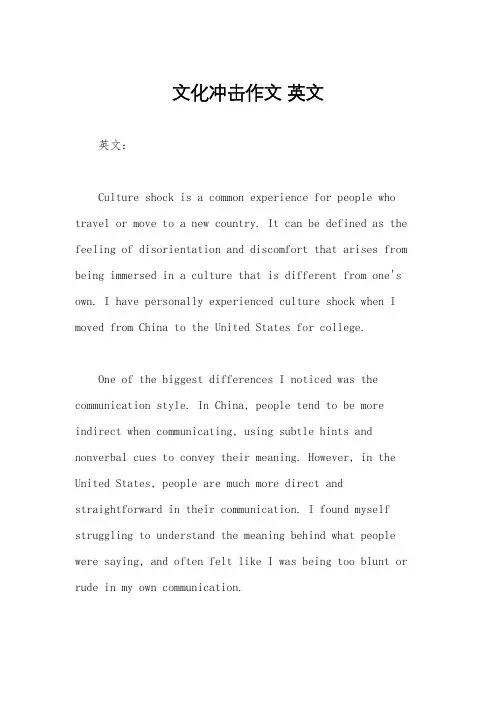
文化冲击作文英文英文:Culture shock is a common experience for people who travel or move to a new country. It can be defined as the feeling of disorientation and discomfort that arises from being immersed in a culture that is different from one's own. I have personally experienced culture shock when I moved from China to the United States for college.One of the biggest differences I noticed was the communication style. In China, people tend to be more indirect when communicating, using subtle hints and nonverbal cues to convey their meaning. However, in the United States, people are much more direct and straightforward in their communication. I found myself struggling to understand the meaning behind what people were saying, and often felt like I was being too blunt or rude in my own communication.Another aspect of culture shock for me was the food. In China, we eat a lot of rice and noodles, and our meals are often centered around family-style dishes. However, in the United States, there is a much wider variety of foods available, and meals are often more individualized. I found myself missing the comfort and familiarity of my favorite Chinese dishes, and struggled to find new foods that I enjoyed.Despite these challenges, I found that I was able to adapt and learn to appreciate the differences between Chinese and American culture. I made friends with people from all over the world, and we shared our experiences and cultures with each other. I also found that by trying new foods and exploring new places, I was able to broaden my horizons and gain a deeper understanding of the world around me.中文:文化冲击是一个常见的经历,对于那些旅行或移居到新国家的人来说。
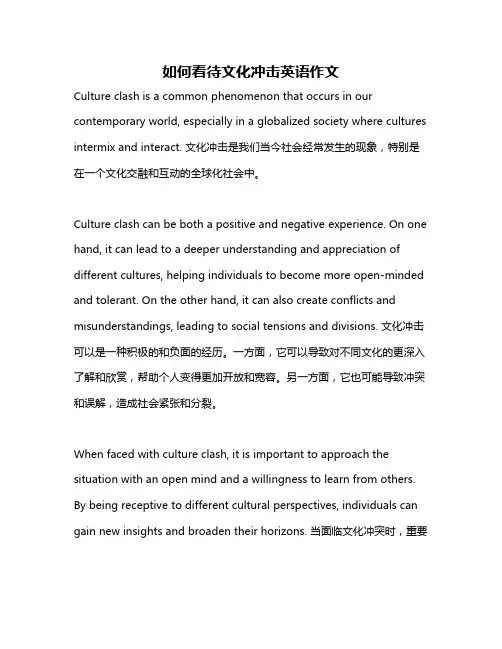
如何看待文化冲击英语作文Culture clash is a common phenomenon that occurs in our contemporary world, especially in a globalized society where cultures intermix and interact. 文化冲击是我们当今社会经常发生的现象,特别是在一个文化交融和互动的全球化社会中。
Culture clash can be both a positive and negative experience. On one hand, it can lead to a deeper understanding and appreciation of different cultures, helping individuals to become more open-minded and tolerant. On the other hand, it can also create conflicts and misunderstandings, leading to social tensions and divisions. 文化冲击可以是一种积极的和负面的经历。
一方面,它可以导致对不同文化的更深入了解和欣赏,帮助个人变得更加开放和宽容。
另一方面,它也可能导致冲突和误解,造成社会紧张和分裂。
When faced with culture clash, it is important to approach the situation with an open mind and a willingness to learn from others. By being receptive to different cultural perspectives, individuals can gain new insights and broaden their horizons. 当面临文化冲突时,重要的是要以开放的心态和愿意向他人学习的态度来应对。
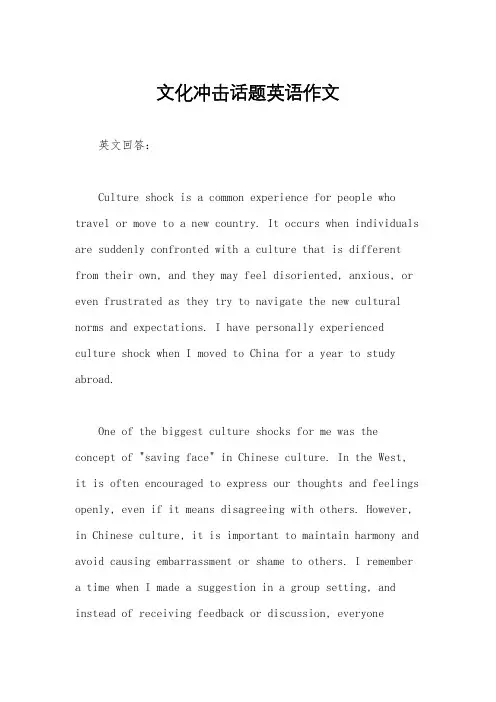
文化冲击话题英语作文英文回答:Culture shock is a common experience for people who travel or move to a new country. It occurs when individuals are suddenly confronted with a culture that is different from their own, and they may feel disoriented, anxious, or even frustrated as they try to navigate the new cultural norms and expectations. I have personally experienced culture shock when I moved to China for a year to study abroad.One of the biggest culture shocks for me was the concept of "saving face" in Chinese culture. In the West, it is often encouraged to express our thoughts and feelings openly, even if it means disagreeing with others. However, in Chinese culture, it is important to maintain harmony and avoid causing embarrassment or shame to others. I remember a time when I made a suggestion in a group setting, and instead of receiving feedback or discussion, everyonesimply nodded and smiled. It took me a while to realizethat my suggestion was not well-received, but no one wanted to openly disagree with me to avoid causing conflict.Another aspect of culture shock for me was the dining etiquette. In China, it is common to share dishes and take small portions from each dish onto your own plate. Coming from a culture where personal space and individual portions are valued, I found it uncomfortable at first to haveothers serving food onto my plate without asking. It tookme some time to adjust and understand that this was a signof generosity and hospitality in Chinese culture.中文回答:文化冲击是一个常见的经历,当人们旅行或搬到一个新的国家时,他们突然面对一个与自己文化不同的文化,他们可能会感到迷茫、焦虑,甚至是沮丧,因为他们试图适应新的文化规范和期望。
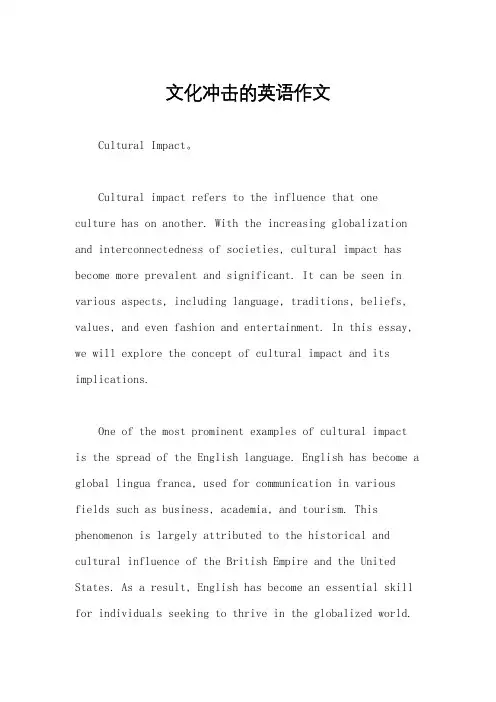
文化冲击的英语作文Cultural Impact。
Cultural impact refers to the influence that oneculture has on another. With the increasing globalization and interconnectedness of societies, cultural impact has become more prevalent and significant. It can be seen in various aspects, including language, traditions, beliefs, values, and even fashion and entertainment. In this essay, we will explore the concept of cultural impact and its implications.One of the most prominent examples of cultural impactis the spread of the English language. English has become a global lingua franca, used for communication in various fields such as business, academia, and tourism. This phenomenon is largely attributed to the historical and cultural influence of the British Empire and the United States. As a result, English has become an essential skill for individuals seeking to thrive in the globalized world.However, the dominance of English has also led to the erosion of indigenous languages and cultures in some regions, raising concerns about linguistic and cultural diversity.Another significant cultural impact is the diffusion of Western values and lifestyles. Western ideals of individualism, consumerism, and democracy have spread around the world through media, technology, and globalization. This has led to both positive and negative consequences. On the positive side, Western values have promoted personal freedom, human rights, and genderequality in many societies. On the negative side, the adoption of Western lifestyles has also resulted in the loss of traditional values and cultural identities. Additionally, the Western influence on beauty standards has led to the rise of body image issues and the global beauty industry.Furthermore, cultural impact can be observed in the realm of traditions and customs. As societies interact and exchange ideas, traditions and customs are often borrowed,adapted, or even replaced. For example, the celebration of Halloween, originally a Celtic festival, has become popular in many countries, even those without historical connections to the festival. Similarly, the popularity of Japanese anime and Korean K-pop music has transcended national boundaries and gained a global following. These examples demonstrate how cultural impact can shape and reshape traditions and entertainment.In conclusion, cultural impact is a complex and multifaceted phenomenon that occurs in various aspects of society. It can be both beneficial and detrimental, depending on the context and perspective. As the world continues to become more interconnected, it is essential to promote cultural diversity and mutual understanding while embracing the positive aspects of cultural impact. By doing so, we can foster a global society that appreciates and respects the richness and uniqueness of each culture.。
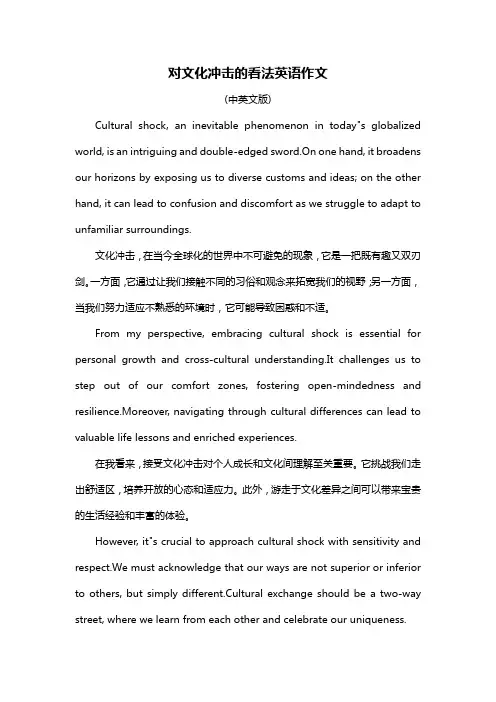
对文化冲击的看法英语作文(中英文版)Cultural shock, an inevitable phenomenon in today"s globalized world, is an intriguing and double-edged sword.On one hand, it broadens our horizons by exposing us to diverse customs and ideas; on the other hand, it can lead to confusion and discomfort as we struggle to adapt to unfamiliar surroundings.文化冲击,在当今全球化的世界中不可避免的现象,它是一把既有趣又双刃剑。
一方面,它通过让我们接触不同的习俗和观念来拓宽我们的视野;另一方面,当我们努力适应不熟悉的环境时,它可能导致困惑和不适。
From my perspective, embracing cultural shock is essential for personal growth and cross-cultural understanding.It challenges us to step out of our comfort zones, fostering open-mindedness and resilience.Moreover, navigating through cultural differences can lead to valuable life lessons and enriched experiences.在我看来,接受文化冲击对个人成长和文化间理解至关重要。
它挑战我们走出舒适区,培养开放的心态和适应力。
此外,游走于文化差异之间可以带来宝贵的生活经验和丰富的体验。
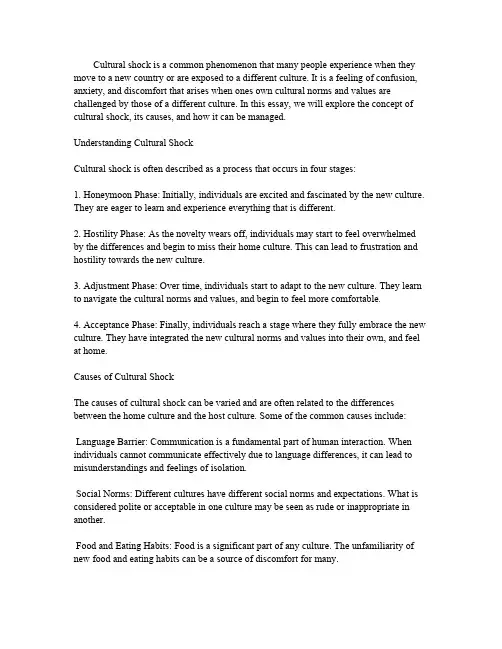
Cultural shock is a common phenomenon that many people experience when they move to a new country or are exposed to a different culture.It is a feeling of confusion, anxiety,and discomfort that arises when ones own cultural norms and values are challenged by those of a different culture.In this essay,we will explore the concept of cultural shock,its causes,and how it can be managed.Understanding Cultural ShockCultural shock is often described as a process that occurs in four stages:1.Honeymoon Phase:Initially,individuals are excited and fascinated by the new culture. They are eager to learn and experience everything that is different.2.Hostility Phase:As the novelty wears off,individuals may start to feel overwhelmed by the differences and begin to miss their home culture.This can lead to frustration and hostility towards the new culture.3.Adjustment Phase:Over time,individuals start to adapt to the new culture.They learn to navigate the cultural norms and values,and begin to feel more comfortable.4.Acceptance Phase:Finally,individuals reach a stage where they fully embrace the new culture.They have integrated the new cultural norms and values into their own,and feel at home.Causes of Cultural ShockThe causes of cultural shock can be varied and are often related to the differences between the home culture and the host culture.Some of the common causes include:Language Barrier:Communication is a fundamental part of human interaction.When individuals cannot communicate effectively due to language differences,it can lead to misunderstandings and feelings of isolation.Social Norms:Different cultures have different social norms and expectations.What is considered polite or acceptable in one culture may be seen as rude or inappropriate in another.Food and Eating Habits:Food is a significant part of any culture.The unfamiliarity of new food and eating habits can be a source of discomfort for many.Value Systems:Deeply ingrained values and beliefs can clash when individuals from different cultures interact.This can lead to feelings of confusion and conflict.Managing Cultural ShockManaging cultural shock involves several strategies that can help individuals adapt to the new culture.These include:Openmindedness:Being open to new experiences and willing to learn about the host culture can help reduce feelings of anxiety and confusion.Seeking Support:Connecting with others who are experiencing similar challenges can provide a sense of community and support.Learning the Language:Efforts to learn the local language can significantly improve communication and understanding of the host culture.Respecting Differences:Recognizing that cultural differences are a part of the human experience and respecting them can help foster a more harmonious relationship with the host culture.SelfCare:Taking care of ones physical and emotional wellbeing is crucial during the adjustment period.This can include maintaining a healthy lifestyle,seeking professional help if needed,and finding time for relaxation and leisure activities.In conclusion,cultural shock is a complex process that can be challenging but also enriching.By understanding its stages,recognizing its causes,and employing effective strategies for management,individuals can navigate this experience and ultimately benefit from the cultural exchange.。
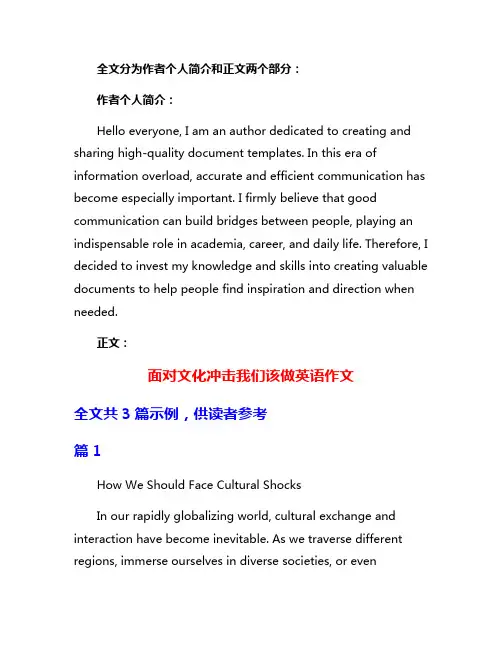
全文分为作者个人简介和正文两个部分:作者个人简介:Hello everyone, I am an author dedicated to creating and sharing high-quality document templates. In this era of information overload, accurate and efficient communication has become especially important. I firmly believe that good communication can build bridges between people, playing an indispensable role in academia, career, and daily life. Therefore, I decided to invest my knowledge and skills into creating valuable documents to help people find inspiration and direction when needed.正文:面对文化冲击我们该做英语作文全文共3篇示例,供读者参考篇1How We Should Face Cultural ShocksIn our rapidly globalizing world, cultural exchange and interaction have become inevitable. As we traverse different regions, immerse ourselves in diverse societies, or evenencounter foreign influences within our own communities, the phenomenon of cultural shock is bound to occur. This term refers to the disorientation, confusion, and unease experienced when encountering unfamiliar customs, values, and norms that diverge from one's own cultural upbringing.Navigating cultural shocks can be a daunting task, but it is a challenge we must confront head-on. Failing to do so can lead to misunderstandings, conflicts, and missed opportunities for personal growth. Therefore, it is crucial that we develop strategies to effectively cope with and embrace these cultural differences.Firstly, we must cultivate an open and inquisitive mindset. Instead of dismissing or judging unfamiliar practices as strange or inferior, we should approach them with curiosity and a willingness to learn. By suspending our preconceptions and biases, we can gain valuable insights into the rich tapestry of human diversity. Asking respectful questions, engaging in dialogues, and actively seeking to understand the historical, social, and philosophical underpinnings of different cultures can foster mutual understanding and appreciation.Secondly, we should embrace flexibility and adaptability. Cultural shocks often stem from our rigid adherence to our owncultural norms and expectations. By recognizing that there are multiple valid ways of viewing and experiencing the world, we can develop the capacity to adapt to new environments and situations. This does not necessarily mean abandoning our own cultural identities, but rather expanding our horizons and finding common ground amidst diversity.Furthermore, we must cultivate empathy and emotional intelligence. Cultural shocks can elicit strong emotional reactions, ranging from confusion and frustration to anxiety and even fear. By acknowledging and validating these emotions, we can better manage our responses and avoid knee-jerk reactions or rash judgments. Developing empathy – the ability to understand and share the feelings of others – can help us navigate cultural differences with greater sensitivity and respect.In addition to personal growth, effectively navigating cultural shocks can have far-reaching implications for fostering global cooperation and peace. By recognizing the inherent worth and dignity of all cultures, we can break down barriers, bridge divides, and promote mutual understanding. This, in turn, can pave the way for productive collaborations, diplomatic resolutions, and the creation of inclusive societies that celebrate diversity.However, it is crucial to acknowledge that cultural shocks can sometimes reveal deeply problematic practices or values that violate fundamental human rights or ethical principles. In such instances, we must strike a delicate balance between respect for cultural diversity and standing firm against injustice or oppression. Through open and respectful dialogue, we can strive to find common ground and work towards positive change while preserving the essence of cultural traditions.In conclusion, navigating cultural shocks is a complex and ongoing process that requires patience, empathy, and a genuine commitment to understanding and appreciating the richness of human diversity. By cultivating open-mindedness, flexibility, emotional intelligence, and a willingness to engage in respectful dialogue, we can not only mitigate the discomfort of cultural shocks but also unlock opportunities for personal growth, global cooperation, and the creation of a more inclusive and harmonious world.篇2How We Should Face Cultural ClashesWe live in an increasingly globalized world where interactions between different cultures have become the normrather than the exception. With modern transportation and technology, people can travel to the farthest corners of the globe and connect with others from vastly different backgrounds. While this cross-cultural exchange has brought many benefits, allowing us to learn from diverse perspectives and broaden our horizons, it has also led to cultural clashes and misunderstandings that can strain relationships between groups.As students preparing to enter this multicultural landscape, it's crucial that we develop strategies for navigating cultural differences respectfully and productively. After all, the ability to bridge cultural divides will be an invaluable skill in our future careers and social lives. So, how exactly should we approach these cultural clashes when they inevitably arise?First and foremost, we must cultivate an attitude of openness and curiosity towards cultures different from our own. Too often, people react to unfamiliar customs or beliefs with fear, hostility or dismissiveness. However, this closed-minded approach only fuels conflict and prevents any meaningful understanding. Instead, we should approach other cultures with a willingness to learn and an eagerness to gain new perspectives.By making a sincere effort to understand the context, history, and reasoning behind different cultural practices, we'll be betterequipped to appreciate their significance rather than judge them from a narrow, ethnocentric viewpoint. This open-mindedness doesn't mean we have to abandon our own values or beliefs, but it does require us to recognize that our way of life isn't the only valid one.Secondly, effective cross-cultural communication is key to preventing and resolving cultural conflicts. Language barriers and divergent communication styles can easily lead to misinterpretations that snowball into larger issues. As students, we should prioritize learning about different cultural norms surrounding communication, such as degrees of directness, nonverbal cues, personal space preferences, and attitudes towards conflict.More importantly, we need to develop crucial skills like active listening, clarifying ambiguities, and exhibiting patience and emotional intelligence when communicating across cultures. Simply being aware that our cultural lenses shape how we give and receive information can go a long way in promoting mutual understanding.Furthermore, we must be willing to challenge our own assumptions and biases about other cultures. Even with the best of intentions, we all hold unconscious prejudices shaped by ourupbringings and environments. When interacting with other cultures, we may find ourselves making snap judgments or harboring stereotypical beliefs without being fully aware of it.To overcome this, we should strive to identify our own cultural biases and examine them critically. We can do this through self-reflection, research, and dialogue with others from different backgrounds. Once we've acknowledged our preconceived notions, we can work on deconstructing them and replacing them with more accurate, nuanced understandings.Ultimately, the most effective way to face cultural clashes may be to reframe the way we view them entirely. Rather than seeing differences as threats or sources of conflict, we should treat them as opportunities for growth, learning, and strengthening the bonds between diverse groups. By embracing the richness that cultural diversity brings to our world, we can transform cultural clashes into cultural collaboration.This transition won't happen overnight, but as students,we're in a unique position to spearhead this shift in perspective for future generations. In our classes, campuses, and communities, we can model how to respectfully discuss and negotiate cultural differences. We can immerse ourselves in other cultures through literature, art, food, and personalconnections. And we can advocate for greater cross-cultural understanding and inclusion in our societies.Of course, facing cultural clashes will always involve some level of discomfort as we step outside our cultural comfort zones. There may be times when we feel confused, offended, or challenged by other belief systems. However, if we approach these situations with humility, empathy, and a sincere desire to find common ground, we'll be far better equipped to turn cultural divides into cultural bridges.The world is becoming increasingly interconnected, making cross-cultural competence not just an asset but a necessity. As students poised to become the next generation of leaders, entrepreneurs, and global citizens, we have a pivotal role to play in shaping how our societies navigate cultural differences. By embodying openness, enhancing our cross-cultural communication, examining our biases, and reframing cultural clashes as opportunities, we can help build a more unified, tolerant, and cooperative world for all.篇3How Should We Respond to Cultural Clashes?Our world is becoming increasingly interconnected and globalized. With modern technology and ease of travel, we are exposed to diverse cultures, customs, and viewpoints from across the globe on a daily basis. While this cultural exchange can be immensely enriching, broadening our horizons and helping us appreciate our differences, it can also lead to clashes and conflicts arising from contrasting values and belief systems. How should we, as students growing up in this multicultural era, navigate these cultural tensions? In my opinion, the answer lies in cultivating open-mindedness, empathy, and a willingness to engage in respectful dialogue.One of the biggest challenges we face in the realm of cultural clashes is overcoming our inherent tendency to view our own culture as the "norm" and anything diverging from it as "strange" or "wrong". From a young age, we are conditioned by our family, community, and society to adopt certain values, traditions, and ways of being that are deemed acceptable and natural within our cultural context. Anything contradicting these ingrained norms can trigger knee-jerk reactions of discomfort, judgment, or even hostility.However, it's crucial for us to recognize that our culture is simply one among myriad equally valid and rich culturaltapestries woven by the diverse peoples of our world. No single culture can claim universal superiority or moral high ground –each one is a product of its unique historical, geographical, and social circumstances, shaped by the lived experiences and worldviews of its people. By approaching cultural differences with an open and inquisitive mindset, we can unlock a deeper understanding and appreciation for the beautiful diversity that exists within our global human family.Empathy is another key ingredient in fostering harmonious intercultural relationships. Too often, cultural clashes arise from a failure to grasp the deeper contexts, motivations, and emotional underpinnings that inform the beliefs and practices of different cultures. Instead of dismissing or condemning unfamiliar customs as "bizarre" or "backward", we should strive to understand the reasoning and significance behind them from the perspective of those who hold them dear.For instance, certain cultural traditions that may seem oppressive or discriminatory to an outsider's eye could, in fact, hold profound symbolic or spiritual meaning for the people practicing them. By making a genuine effort to walk in their shoes, to understand their histories and lived realities, we cancultivate a deeper sense of compassion and respect, even if we don't necessarily agree with or adopt those practices ourselves.Empathy also involves acknowledging and addressing the power imbalances and historical injustices that have shaped the dynamics between different cultures. Many cultural conflicts stem from legacies of colonialism, oppression, and marginalization, where dominant cultures have systematically suppressed or devalued the traditions and identities of minority or indigenous groups. Addressing these deep-rooted inequities and trauma requires a willingness to listen to and amplify the voices of those who have been historically silenced or oppressed.Ultimately, the key to navigating cultural clashes lies in open and respectful dialogue. Instead of shutting down or attacking differing perspectives, we should create safe spaces where people from diverse backgrounds can come together to share their stories, express their viewpoints, and engage in constructive discourse aimed at finding common ground and mutual understanding.Such dialogues should be grounded in a spirit of humility, acknowledging that no single culture or individual holds a monopoly on truth or wisdom. We must be willing to challenge our own assumptions, biases, and preconceptions, and remainopen to having our worldviews expanded and transformed through meaningful interactions with those who see the world through different lenses.At the same time, these dialogues should not shy away from addressing difficult or contentious topics. Cultural clashes often arise from deeply rooted disagreements over fundamental issues like gender roles, religious beliefs, or ethical principles. While we may not always reach consensus on these complex matters, engaging in respectful and nuanced discussions can help us better understand the rationale and contexts behind differing viewpoints, fostering greater mutual respect and coexistence.In addition to interpersonal dialogues, we should also encourage and participate in broader public discourse and debates around cultural issues. Whether through academic forums, community events, or digital platforms, these discussions can help raise awareness, promote cross-cultural understanding, and shape more inclusive and equitable policies and practices within our societies.Of course, navigating cultural clashes is not always easy, and there will inevitably be situations where certain cultural practices or beliefs clash with fundamental human rights or ethical principles. In such cases, we must be willing to take a principledstand against practices that cause harm or infringe upon the dignity and autonomy of individuals, regardless of cultural justifications.However, even in these challenging scenarios, our approach should be rooted in empathy, open communication, and a genuine desire to find ethical and respectful resolutions that uphold universal human rights while still acknowledging and preserving the positive aspects of diverse cultural identities.As students growing up in an increasingly interconnected world, it is our responsibility to actively engage with these complex cultural dynamics and strive to be agents of positive change. By embracing open-mindedness, empathy, and respectful dialogue, we can transform cultural clashes into opportunities for mutual growth, understanding, and the celebration of our rich human tapestry.Instead of erecting walls of division and mistrust, let us build bridges of compassion and connection that allow us to learn from and enrich one another, creating a more harmonious and inclusive global community. The path may not be easy, but by walking it together with open hearts and minds, we can forge a future where our cultural differences are celebrated as sources ofbeauty and wisdom, rather than flashpoints for conflict and intolerance.。
高中生英语作文《全球化对传统文化的冲击》【中英文实用版】The Impact of Globalization on Traditional CultureWith the rapid development of economy and technology, globalization has become an indispensable part of our life.People from different parts of the world can easily communicate and exchange ideas.However, this phenomenon also brings a great challenge to traditional culture.In this essay, we will discuss the impact of globalization on traditional culture and how we can protect it.First and foremost, globalization has led to the homogenization of culture.Due to the widespread influence of Western culture, many traditional customs and practices are gradually being forgotten.For example, in China, the traditional tea culture is being replaced by fast-food culture.This not only affects the physical health of people, but also leads to the loss of cultural diversity.Secondly, globalization has caused the disappearance of many local languages and dialects.As people from different cultures mix more frequently, they tend to use a common language for communication.While this facilitates communication, it also leads to the loss of linguistic diversity.For instance, in many countries, young people are more inclined to use English than their native language, which may result in the eventual extinction of local languages.Lastly, globalization has had a negative impact on traditional industries.As global supply chains become more integrated, many traditional industries are being replaced by more efficient and cost-effective production methods.This not only leads to the loss of traditional skills, but also contributes to the destruction of the environment.To address these challenges, it is essential for us to take action to protect traditional culture.One way is to promote the education of traditional culture in schools.By learning about their own cultural heritage, students will develop a sense of pride and responsibility for protecting it.Another way is to encourage the preservation and promotion of traditional industries.By supporting local products, we can help to ensure the survival of traditional skills and crafts.In conclusion, globalization has indeed brought many benefits to our world, but it has also posed challenges to traditional culture.It is up to us to find ways to protect and promote traditional culture, so that it can continue to thrive in the face of globalization.。
文化冲击话题英语作文英文回答:Culture shock is a common experience for people who travel or move to a new country. It occurs when individuals encounter a way of life, customs, and social norms that are different from what they are used to. I have personally experienced culture shock when I moved to the United States from China for my studies.One of the biggest culture shocks for me was the concept of personal space. In China, people are used to being in close proximity to one another, but in the US, there is a greater emphasis on personal space. I remember feeling uncomfortable when people stood too close to me in line or in crowded places. It took me some time to adjust to this and understand that it was just a cultural difference.Another aspect of culture shock for me was the food.American cuisine is quite different from Chinese cuisine, and I initially struggled to find food that I enjoyed. I missed the flavors and dishes that I was accustomed to back home. However, over time, I discovered new foods that I liked and learned to appreciate the diversity of American cuisine.Furthermore, the communication style in the US was also a source of culture shock for me. In China, direct communication is not as common, and there is a greater emphasis on saving face and maintaining harmony in interactions. However, in the US, people tend to be more direct and assertive in their communication, whichinitially caught me off guard. I had to learn to adapt to this style of communication and become more assertive in expressing my own thoughts and opinions.Overall, experiencing culture shock has been a valuable learning experience for me. It has helped me become more open-minded, adaptable, and understanding of different cultural perspectives. While it was challenging at times, I believe that it has ultimately enriched my life andbroadened my horizons.中文回答:文化冲击是一个常见的经历,对于那些旅行或者移居到一个新的国家的人来说。
英语作文culture shock(中英文实用版)English:Culture shock is an inevitable experience for those who venture into the unknown realms of a different culture.It"s like a rollercoaster ride, filled with ups and downs, as one tries to navigate through the labyrinth of unfamiliar customs, traditions, and social norms.From the moment I stepped into the bustling streets of Tokyo, I was overwhelmed by the vibrant fusion of ancient rituals and futuristic technology.The politeness and formality in interactions took me by surprise, a stark contrast to the casual informality back home.Yet, amidst the chaos of cultural differences, lies the beauty of adaptation and growth, a journey that shapes one"s perspective and broadens their horizons.中文:文化冲击对于那些勇敢踏入不同文化领域的人来说是一种无法避免的经历。
这就像是一场过山车之旅,充满了起伏,因为一个人试图穿越充满陌生习俗、传统和社会规范的迷宫。
对文化冲击的看法英语作文英文回答:Culture shock refers to the feeling of disorientation and confusion that people experience when they are exposedto a culture that is significantly different from their own. It can occur when traveling to a foreign country, studying abroad, or even when interacting with individuals from different cultural backgrounds in one's own country. Personally, I believe that culture shock can have both positive and negative effects on individuals.On one hand, culture shock can be a source ofexcitement and adventure. Experiencing new customs, traditions, and ways of life can broaden one's horizons and help them develop a more global perspective. For example, when I traveled to Japan, I was initially overwhelmed bythe bustling streets, the language barrier, and the unfamiliar food. However, as I immersed myself in the culture, I began to appreciate the beauty of theirtraditional tea ceremonies, the precision and discipline of martial arts, and the importance they place on respect and harmony. These experiences not only enriched my understanding of Japanese culture but also allowed me to reflect on my own cultural values and norms.On the other hand, culture shock can also be a challenging and stressful experience. The unfamiliarity of the new culture can lead to feelings of homesickness, frustration, and even loneliness. For instance, when I moved to the United States for my studies, I struggled with the different educational system, the fast-paced lifestyle, and the cultural norms that were vastly different from my own. It took time for me to adjust and find my place inthis new environment. However, through this process, I learned to be adaptable, open-minded, and resilient. I also formed strong bonds with fellow international students who were going through a similar experience, which provided a sense of support and belonging.中文回答:文化冲击是指当人们接触到与自己的文化截然不同的文化时所感受到的迷失和困惑。
文化冲击英语作文模板英文回答:Cultural Shock: An Inevitable Experience。
Cultural shock is an unavoidable phenomenon for individuals who immerse themselves in a foreign environment significantly different from their own. It refers to the psychological and emotional distress experienced when encountering unfamiliar cultural norms, values, and practices.Initially, individuals may experience a sense of disorientation and alienation. They may struggle tonavigate social interactions, comprehend the local language, or adapt to unfamiliar customs. This can lead to feelingsof anxiety, confusion, and even a loss of identity.However, cultural shock can also present opportunities for growth and self-discovery. By embracing the unfamiliar,individuals can develop a broader perspective, challenge their own beliefs, and enhance their cultural sensitivity. Over time, they may come to appreciate the unique aspectsof their new environment and gain a newfound understandingof their own culture.To mitigate the effects of cultural shock, it is essential to approach the experience with an open mind anda willingness to learn. Engage in conversations with locals, attend social events, and immerse yourself in the local culture. Seeking support from friends, family, or community organizations can also provide a sense of belonging and reduce feelings of isolation.Chinese Answer:文化冲击,一种不可避免的体验。
写一篇关于文化冲击的英语作文English response:Culture shock, a sense of disorientation and confusion that individuals experience when coming into contact with a new and unfamiliar culture, is a complex and multifaceted phenomenon. It can manifest in a variety of ways, including feelings of homesickness, isolation, anxiety, and even depression. Culture shock occurs when an individual's expectations and assumptions about a new culture are not met, leading to feelings of unease and uncertainty.One way to mitigate the effects of culture shock is to embrace the new culture with an open mind and a willingness to learn. It is important to be respectful of the local customs and traditions, even if they differ from your own. Making an effort to connect with local people and immerse yourself in the culture can help you to better understand and appreciate the new environment.Chinese response:文化冲击是一种当个人接触到一种新的和不熟悉的文化时所经历的迷失方向和混乱感,它是一种复杂且多方面的现象。
关于文化冲击的英语作文及翻译_高二满分英语作文2篇高分英语作文1:Culture shock and
Dear Copernicus, I know you have finished your heliocentric saying, and I hope you can express your theory, because it is not only your wisdom, but also scientific truth.
I know that you are a person who has been faced with difficulties. Your theory will bring great impact to human beings, and it will make mankind stride forward in the direction of science.
In order to reveal the truth, let people see that you are a great man, and let mankind move towards a new era, we are looking forward to your theory. Good luck, XXX.
中文翻译:
亲爱的哥白尼我知道你已经完成了你的日心说,我希望你能表达你的理论,因为这不仅是你的智慧,也是科学真理。
我知道你是一个曾经面对困难的人你的理论会给人类带来巨大的冲击,它将使人类向科学的方向迈进一大步为了揭示,让人们看到你是一个伟大的人,让人类走向一个新时代,我们期待着你对你的理论,祝你好运,XXX。
万能作文模板2:文化冲击和
Dear Copernicus, I know that you have finished heliocentric saying, and I hope you can express your theory, because it is not only your wisdom, but also scientific truth.
I know that you are a person who has been faced with difficulties. Your theory will bring great impact to human beings, and it will make mankind stride forward a big step towards the scientization it allows.
In order to reveal the truth, let people see that you are a great man, and let mankind move towards a new era, we are looking forward to your theory. Good luck, good luck, XXX.
中文翻译:
亲爱的哥白尼,我知道你已经完成了日心说,我希望你能表达你的理论,因为这不仅是你的智慧,也是科学真理。
我知道你是一个曾经面对困难的人你的理论会给人类带来巨大的冲击,它将使人类朝着它所允许的科学化迈进了一大步为了揭示,让人们看到你是一个伟大的人,让人类走向一个新的时代,我们期待你对你的理论,祝你好运,祝你好运,XXX。
满分英语范文3:文化冲击的及
Is it a more noble thought, enduring the slingshot and arrows of shameless fate, or struggling with arms in the vast troubles, opposing the end of them to die and go to sleep? This is a question. We can no longer use one sleep to end the heartache and thousands of natural shocks borne by the body. It is a kind of complete and devout hope to die, sleep, or dream, in death In the sleep of death, what dreams may appear.
中文翻译:
是不是更高尚的思想,忍受着的命运的弹弓和箭,或是带着手臂在浩瀚的烦恼中挣扎,反对结束它们去死,去睡觉,这是一个问题,再也不能用一个睡眠来结束所承受的心痛和上千次的自然冲击,这是一种圆满,虔诚地希望死亡,入睡,或者做梦啊,在死亡的睡眠中,有什么梦想可能会出现。